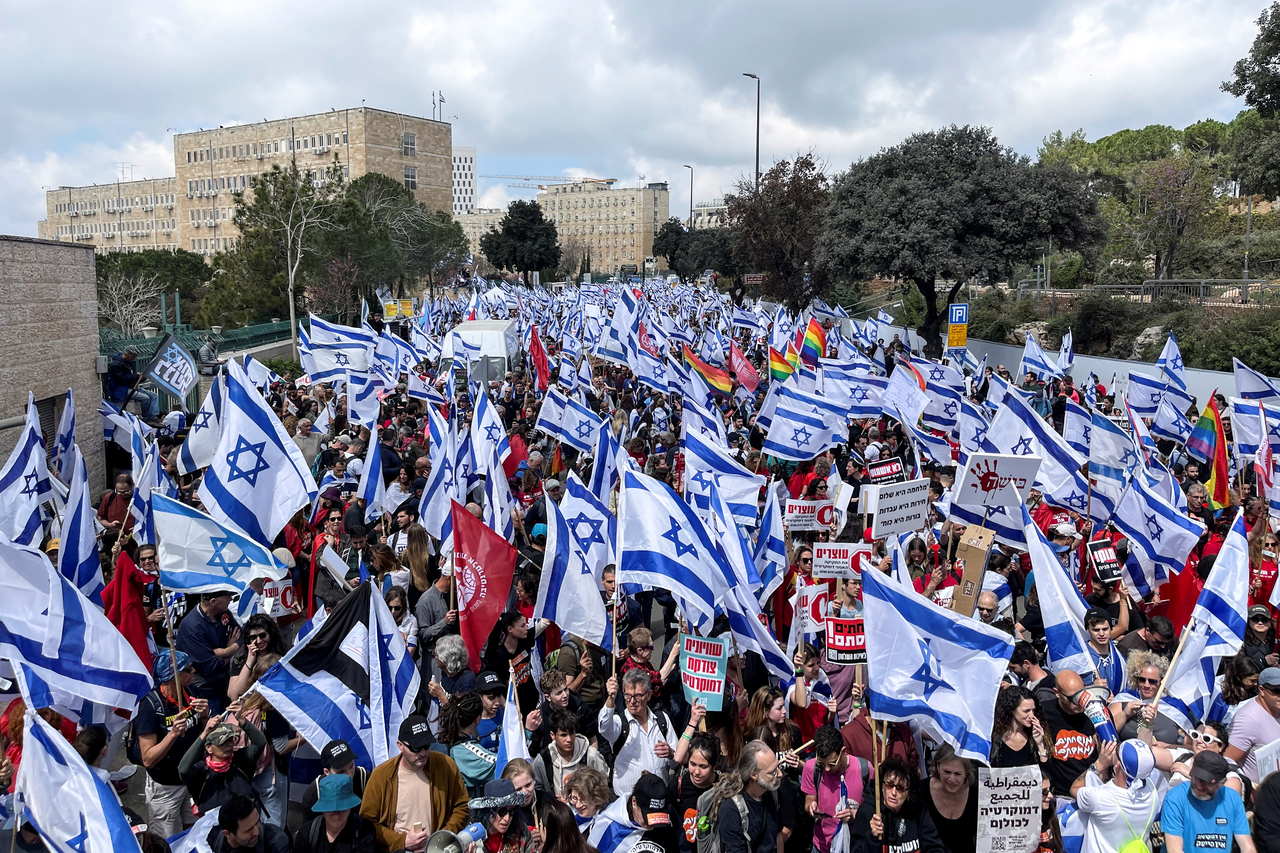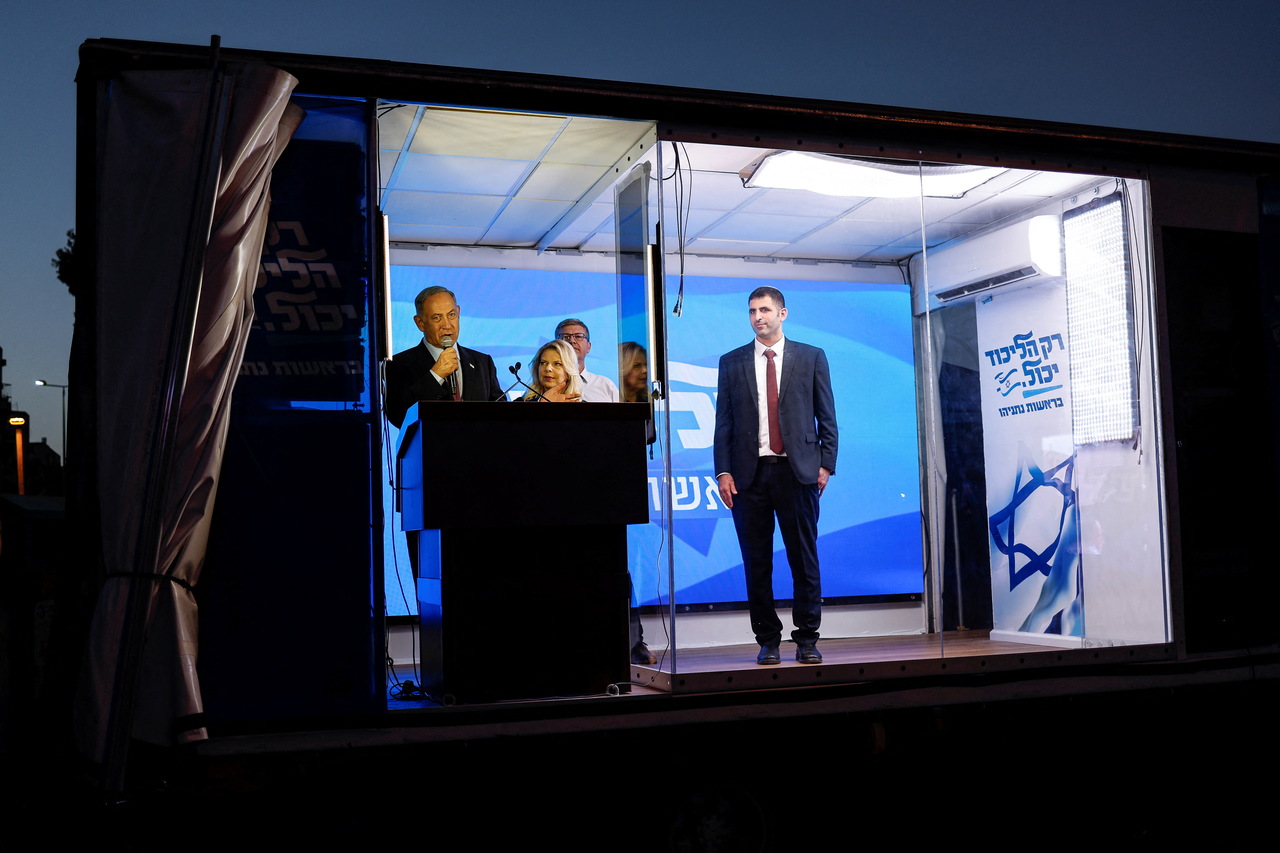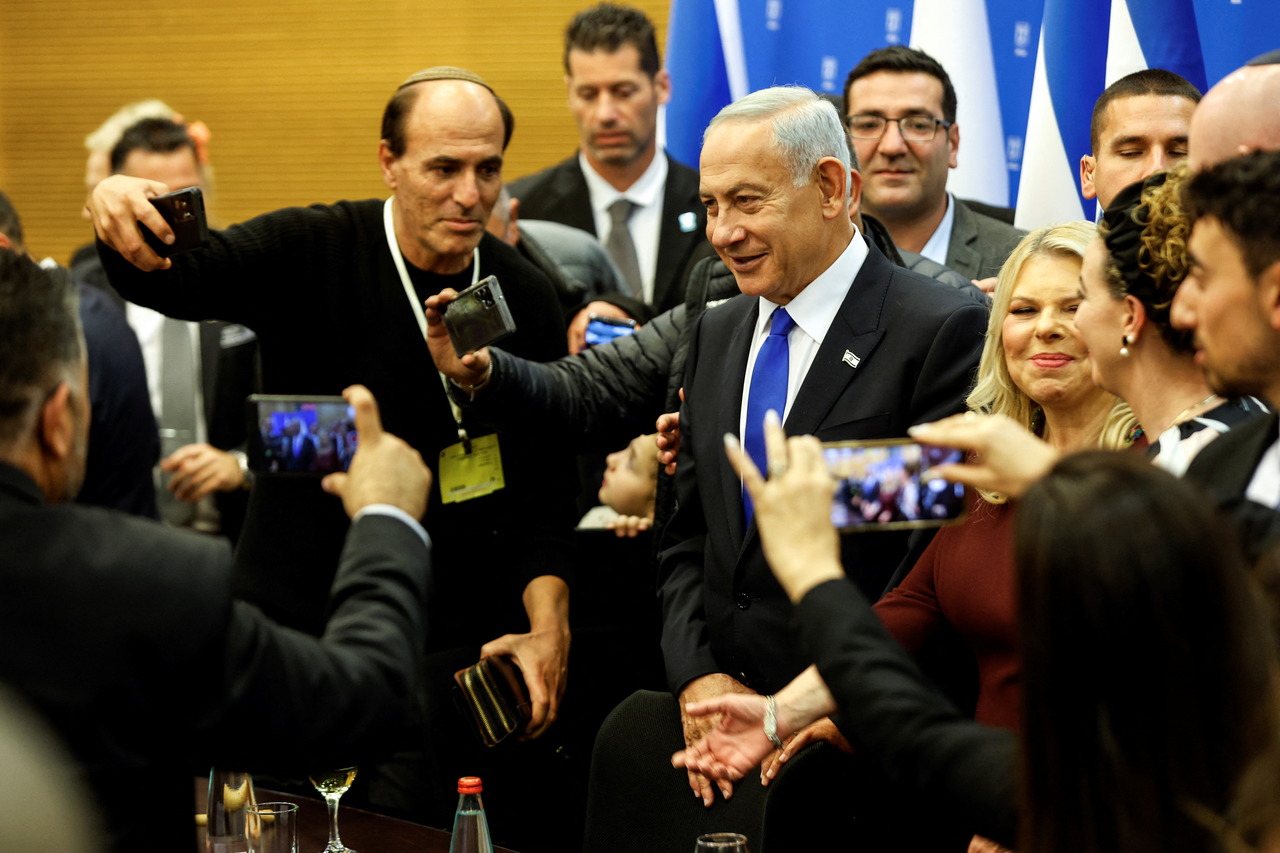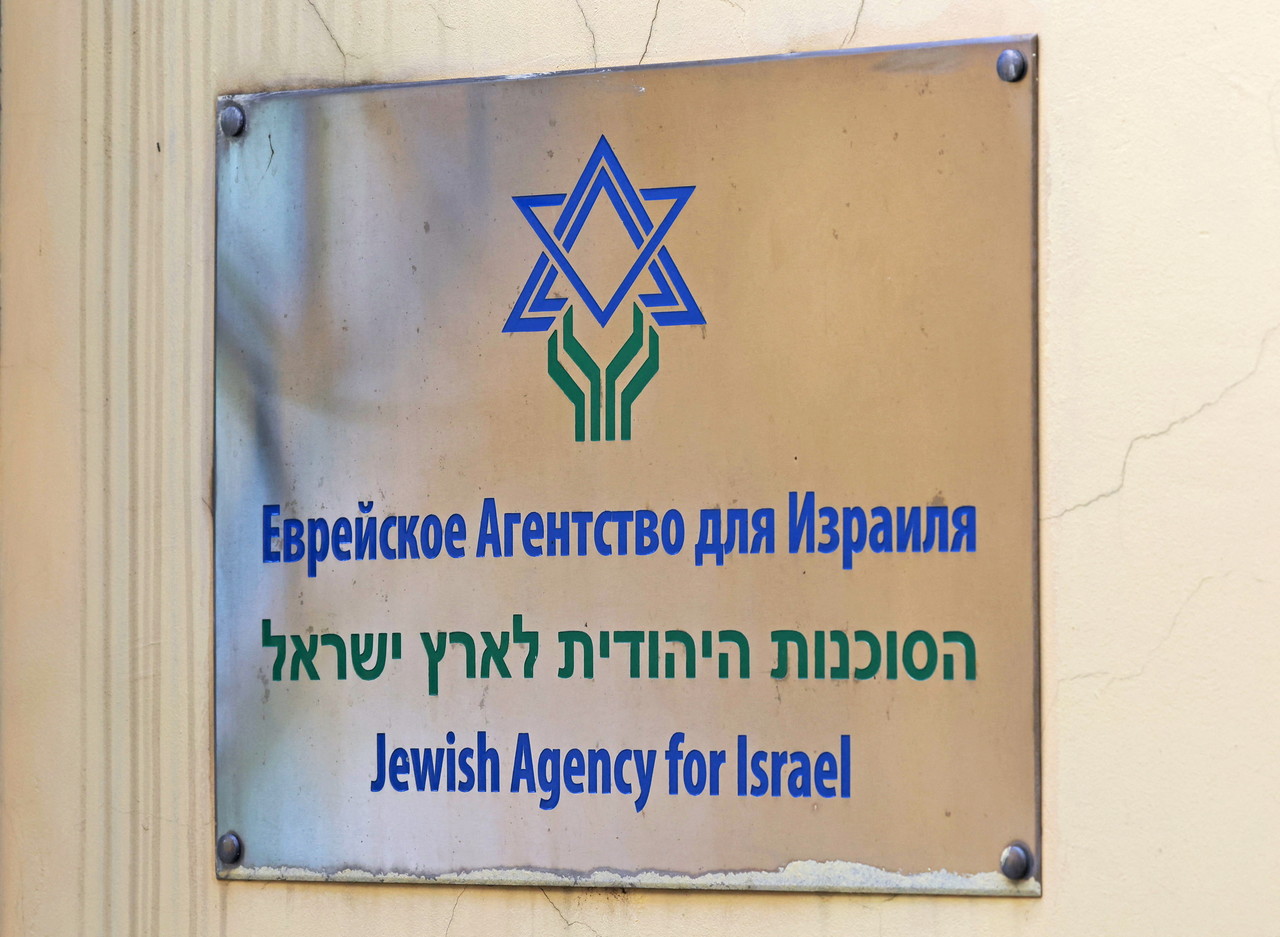Israel on a Collision Course: 100 Days of Netanyahu's New Government
The first months since the return to power of Benjamin Netanyahu were marked by a political crisis related to the changes in the Israeli justice system pursued by the coalition and an aggravation of the security situation in the West Bank. The suspension of the controversial changes only temporarily dims a conflict that has led to mass protests and deepening social polarisation. The internal crisis and the escalation of Israeli-Palestinian violence are reducing the effectiveness of the new government’s foreign policy.
 ILAN ROSENBERG / Reuters / Forum
ILAN ROSENBERG / Reuters / Forum
In Israel, there is an ongoing conflict of powers between the executive and the judiciary. The Israeli political system is not based on a single constitution, but on a system of basic laws defining the competences of individual institutions and the values and civil rights protected by the state. Within its framework, the role of the Supreme Court (SC) is key as a control body and a kind of constitutional court whose authority results primarily from its own jurisprudence, not from provisions in statute. Within this legal framework, the Attorney General (AG) also has extensive powers, including as head of the investigative apparatus and official legal adviser to the government.
Root of the Crisis
In recent years, the right-wing and religious part of the electorate and its political representation have been increasing pressure to limit the powers of the judiciary. The main allegations are excessive interference in the activities of the government and legislative, insufficient participation of democratically mandated bodies in the selection of judges, and a lack of transparency. In addition, there are accusations of elitism within the judiciary and ideological bias in jurisprudence in favour of left-liberal positions at the expense of other interests, such as those the Jewish religious camp. Discord in recent years also was aroused by the high level of activity of the AG and SC after accusations of corruption against Prime Minister Netanyahu in a previous time in office and competence disputes during elections. At the same time, the SC relatively rarely determined laws to be unconstitutional, and those it overturned concerned mainly issues closely related to the political interests of the right-wing, such as conscription of the ultra-Orthodox population, administrative detention of migrants, or seizure of private Palestinian land in the West Bank (WB).
The current crisis started in January with the announcement by Netanyahu’s government of a justice reform plan. The proposals included increasing the role of politicians from the government coalition in the judges appointment committee (from 4 to 7 out of 9 members), allowing the Knesset to reject verdicts of unconstitutionality (unless announced by the entire 15-member SC bench), separating the functions and limiting the prerogatives of the AG and changes in adjudication by the Supreme Court (e.g., prohibiting the assessment of the constitutionality of basic laws). Additionally, other legal changes and bills were introduced, including transferring the AG’s competence to declare the prime minister incapable of holding office to the hands of the cabinet and the Knesset, changes in the procedure for appointing the chairman of the SC (the term of office of current chief, Ester Hayut, expires this year), or solutions favouring government representatives (e.g., consent to external financing of their lawsuits).
Internal Turmoil
The government’s proposals, and especially their scale and the quick process, met with sharp resistance from the parliamentary opposition and a large part of the public—in opinion polls, on average, over 60% of respondents are against the reforms. In January, regular weekly demonstrations began, mainly in the largest cities, gathering hundreds of thousands of protesters. At various stages, objections were expressed by, among others, Israel’s start-up industry, academics, non-governmental organisations, and reservists (e.g., some aviation reservists refused to participate in training). Strong objections from military circles rose from the fear that a politicised judiciary would lose credibility as an independent institution investigating the responsibility of Israeli soldiers for actions in Palestinian territories. Thus, it would strengthen the arguments for prosecuting them before international courts. The pace and scope of the reforms also raised disagreement among politicians from the prime minister’s own party, Likud. The protests culminated at the end of March in connection with the progress of legislative work, which coincided with the dismissal of Minister of Defence Yoav Gallant (Likud), who had called for the work to slow down. According to some estimates, up to 700,000 people took part in the mass demonstrations (out of 9.5 million citizens) and trade unions announced a general strike. As a result, Netanyahu agreed that work on the reforms would be suspended until the next session of the Knesset (at the end of April). At the same time, in order to ensure the stability of the government, he decided to make concessions to the coalition partners, for example, on the establishment of a national guard controlled by the National Security minister, currently Itamar Ben-Gvir. Talks are underway between government representatives and part of the opposition, with the role of mediator played by President Isaac Herzog, who also presented his own compromise slate of reforms.
State of the Israeli-Palestinian Conflict
In addition to the political crisis, the other primary challenge for Netanyahu’s government is the security situation in the West Bank, which has been deteriorating since last year. Already this year, 86 Palestinians have been killed (mostly in exchanges of fire with the Israeli military) as well as 15 Israelis. New local armed groups, mainly from Nablus and Jenin, have started to play a greater role in the clashes with Israeli forces in the WB, a result of the weakening of the Palestinian Authority (PA) and its security forces. There was also an increase in the number of attacks by Jewish settlers on the Palestinian population, which were most often met with a limited response by the Israeli security forces. The most serious attack was in retaliation for the murder of two settlers in Huwara. About 100 Palestinians were injured and one person died, and the settlers committed arson and damaged property. New decisions by the Israeli government are an additional destabilising factor (including the withdrawal of a ban on settlements in the areas of the WB abandoned during the 2005 Disengagement) and competence disputes between the Ministry of Defence and Minister Bezalel Smotrich form the right-wing Religious Zionism, which is responsible for the Israeli civilian administration of the WB.
The situation in the Palestinian territories, as well as the rhetoric of radical politicians in Israel, generated protests from Israel’s Arab allies, including the United Arab Emirates. Sharp criticism has also come from Saudi Arabia, with which the Israeli government is seeking to establish relations. An increase in tensions with the U.S. is also visible. Biden administration representatives and the president himself regularly express concern about the internal reforms and the security situation in Israel. American diplomacy, along with Jordan and Egypt, engaged in de-escalation attempts to improve cooperation between Israel and the PA leadership.
Perspectives
From the view of the right-wing religious coalition and its electorate, the current model of the judiciary and legal institutions makes it impossible to achieve their most important political goals. There is thus a serious risk that the political crisis in Israel will become constitutional, especially since the government representatives do not hide the tactical nature of the suspension of reforms. For Netanyahu, withdrawing from or reducing the scope of the reforms would mean entering into a conflict with his coalition partners and the risk of the government collapsing unless he finds support from other parties in the Knesset (e.g., from Blue and White). Factors that might have a major impact on the future of the reforms are the opposition’s activities, financial markets’ reactions, and a mobilised civil society, as well as the attitude of Israel’s external partners. In this context, the EU institutions and the U.S. should clearly declare their support for the proper observance of the separation of powers in Israel and the implementation of possible changes in a spirit of consensus.
The lack of greater involvement on the Israeli side in limiting settler violence, for example, will make it difficult to stabilise Israeli-Palestinian relations. The actions of radical politicians in the current government, combined with the growing destabilisation in the WB, may additionally weaken the building of relations with Arab states and the prospects of new partnerships (mainly with Saudi Arabia), which, along with the Iran conflict, are a priority for Netanyahu. Focusing on the domestic situation makes Israeli foreign policy more reactive and focused on cooperation with its closest allies and ideologically like-minded governments, such as Hungary, India, and Italy. From Poland's perspective, positive developments are the new government’s efforts to improve bilateral relations, as well as signals about an increase in Israeli support for Ukraine, such as plans to deliver anti-drone systems.





